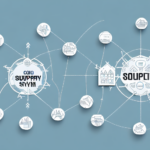Introduction to Shipping Pilot's 3PL Logistics Fulfillment Services
In today's competitive business landscape, efficient logistics management is crucial for distinguishing successful companies from their rivals. The ability to swiftly and effectively move goods and deliver them to customers not only secures customer loyalty but also maintains a competitive edge. Third-party logistics (3PL) fulfillment services have consequently become increasingly significant, enabling businesses to streamline their supply chain operations. In this article, we explore the key features of Shipping Pilot's 3PL logistics fulfillment, its importance for businesses, and the myriad benefits it offers to enhance operational efficiency.
Understanding 3PL Logistics Fulfillment and Its Importance for Your Business
Third-party logistics (3PL) involves outsourcing various supply chain and logistics functions to a specialized provider. These services typically include warehousing, inventory management, order processing, and shipping. By partnering with a 3PL provider, businesses can focus on their core competencies, such as product development and marketing, while leveraging the expertise of logistics professionals to handle complex logistics tasks.
According to a report by Statista, the global 3PL market was valued at approximately $1.6 trillion in 2023, reflecting a compound annual growth rate (CAGR) of 7.5% from 2020. This growth highlights the increasing reliance of businesses on 3PL services to optimize their supply chains, reduce operational costs, and enhance customer satisfaction.
3PL logistics fulfillment is essential for businesses aiming to improve their supply chain efficiency. 3PL providers possess the necessary expertise and resources to manage intricate logistics operations, including international shipping, customs clearance, and regulatory compliance. Additionally, they utilize advanced technologies and software solutions that facilitate real-time inventory tracking, shipment monitoring, and data analytics, providing businesses with greater visibility and control over their logistics processes. By integrating a 3PL provider into their operations, businesses can achieve significant cost savings, improve delivery times, and elevate their customer service standards.
Shipping Pilot's Evolution in 3PL Logistics Fulfillment
Over the past few years, Shipping Pilot's 3PL logistics fulfillment services have undergone significant transformations to cater to the evolving needs of its diverse clientele. Originally established as a small logistics provider catering to e-commerce businesses, Shipping Pilot has expanded its services to offer comprehensive solutions for businesses of all sizes across various industries.
The company's growth has been fueled by substantial investments in cutting-edge technology and state-of-the-art infrastructure, ensuring the delivery of top-tier logistics services. Today, Shipping Pilot's 3PL logistics fulfillment encompasses a broad spectrum of services, including warehousing, inventory management, kitting and assembly, and diverse shipping options tailored to meet the unique needs of each business.
A pivotal aspect of Shipping Pilot's success is its unwavering commitment to sustainability. The company has implemented numerous eco-friendly initiatives, such as deploying electric vehicles for transportation and adopting energy-efficient practices within their warehouses. These measures not only contribute to environmental conservation but also translate into cost savings for both the company and its clients.
Furthermore, Shipping Pilot places a strong emphasis on customer service excellence. With a dedicated team of customer service representatives available around the clock, clients receive prompt assistance with inquiries, order tracking, and any logistical concerns. This dedication to superior customer support has fostered a loyal customer base and reinforced Shipping Pilot's reputation as a dependable logistics partner.
Core Features of Shipping Pilot's 3PL Logistics Fulfillment
- Advanced Inventory Management: Shipping Pilot utilizes sophisticated inventory management systems that provide real-time tracking and management of stock levels. This ensures that clients maintain optimal inventory levels, minimizing the risk of stockouts or overstocking. Additionally, these systems integrate seamlessly with clients' own platforms, facilitating streamlined operations.
- Kitting and Assembly Services: The company offers comprehensive kitting and assembly services, enabling businesses to bundle products or assemble customized kits efficiently. This capability simplifies the fulfillment process for clients, allowing them to offer product bundles that enhance customer value and drive sales.
- Versatile Shipping Solutions: Shipping Pilot provides a range of shipping options to meet diverse client needs, including same-day shipping, overnight delivery, and international shipping. These options ensure that businesses can meet varying customer expectations and adapt to different market demands.
- Customized Packaging Solutions: Recognizing the importance of branding and customer experience, Shipping Pilot collaborates with businesses to design and implement customized packaging solutions. This includes the creation of bespoke boxes, inserts, and labels that reflect the brand's identity and enhance the unboxing experience for customers.
- Dedicated Customer Support: With a team of logistics experts available 24/7, Shipping Pilot offers unparalleled customer support. Clients can access real-time order tracking, manage returns efficiently, and receive expert guidance on optimizing their fulfillment processes.
For detailed information on Shipping Pilot's kitting and assembly services, visit What is Kitting?.
Choosing the Right 3PL Provider for Your Business
Selecting the appropriate 3PL provider is a critical decision that can significantly impact your business's operational efficiency and customer satisfaction. When evaluating potential 3PL partners, consider the following factors:
- Experience and Expertise: Assess the provider's experience in your specific industry and their ability to handle the unique logistics challenges it presents.
- Reputation and References: Research the provider's reputation in the market and seek references or testimonials from existing clients.
- Technology and Integration: Ensure the 3PL utilizes advanced technology systems that can seamlessly integrate with your existing platforms for real-time data sharing and process automation.
- Scalability: Choose a provider that can scale their services in alignment with your business growth and fluctuating demand levels.
- Pricing Structure: Evaluate the provider's pricing models to ensure they offer competitive rates that align with your budget and provide value for the services rendered.
Shipping Pilot's 3PL logistics fulfillment stands out in the market with over a decade of industry experience. Their robust technological infrastructure, combined with a customer-centric approach and competitive pricing, makes them a preferred choice for businesses seeking reliable logistics solutions.
Moreover, Shipping Pilot offers flexible service packages that can adapt to the evolving needs of businesses, ensuring that as your operations grow, your logistics support can expand accordingly.
Benefits of Outsourcing Fulfillment to a 3PL Provider
Outsourcing fulfillment services to a 3PL provider like Shipping Pilot offers numerous advantages for businesses aiming to enhance their operational efficiency and customer satisfaction:
- Focus on Core Competencies: By entrusting logistics to a 3PL provider, businesses can concentrate their resources and efforts on their primary activities, such as product development, marketing, and sales.
- Scalability and Flexibility: 3PL providers can efficiently scale operations up or down based on fluctuating demand, allowing businesses to maintain agility in response to market changes.
- Cost Reduction: Leveraging the provider's bulk purchasing power and established logistics infrastructure can lead to significant cost savings in areas such as transportation, warehousing, and labor.
- Enhanced Customer Satisfaction: With faster and more reliable shipping options, businesses can ensure timely deliveries and improve overall customer satisfaction.
Furthermore, partnering with a 3PL allows businesses to enter new markets with ease. Shipping Pilot, with its extensive experience in international shipping and compliance, enables businesses to expand geographically without the need to navigate the complexities of global logistics independently.
Access to advanced technology is another critical benefit. Shipping Pilot provides businesses with sophisticated inventory management systems, order tracking software, and automated shipping processes, enhancing operational efficiency and providing valuable data insights for informed decision-making.
Implementing and Measuring the Success of Shipping Pilot's 3PL Fulfillment
Understanding the operational workflow of Shipping Pilot's 3PL logistics fulfillment is essential for effectively integrating their services into your supply chain. Here's a step-by-step guide:
- Product Reception: The business sends its products to Shipping Pilot's strategically located warehouse facilities.
- Inventory Ingestion: Upon receipt, Shipping Pilot's team scans and records the products into their inventory management system, ensuring accurate tracking.
- Order Integration: The business transmits orders to Shipping Pilot's system through various methods, including API integrations, CSV file uploads, or manual data entry.
- Picking and Packing: Shipping Pilot employs efficient picking and packing processes to prepare orders for shipment, ensuring accuracy and care.
- Shipping and Delivery: Orders are dispatched to end customers using Shipping Pilot's network of carrier partners, selected based on optimal delivery timelines and cost-efficiency.
- Tracking and Updates: Both the business and its customers receive real-time shipping updates and tracking information, enhancing transparency and communication.
Shipping Pilot's comprehensive 3PL logistics fulfillment services offer several advantages, including the ability to focus on strategic business areas, access to a diverse network of carriers for cost-effective and timely deliveries, and utilization of advanced technology for supply chain optimization. Additionally, their customizable service offerings enable businesses to tailor the fulfillment process to their specific needs, ensuring flexibility and scalability.
The seamless integration and high level of customization provided by Shipping Pilot make it an ideal partner for businesses seeking to enhance their logistics operations while maintaining agility and control over their supply chain.
To measure the success of your 3PL logistics fulfillment strategy, consider tracking key performance indicators (KPIs) such as order accuracy, shipping speed, on-time delivery rates, customer satisfaction, and cost metrics. Leveraging data analytics and reporting tools provided by Shipping Pilot can offer deeper insights into supply chain performance, allowing for continuous improvement and informed decision-making. For comprehensive guidelines on measuring fulfillment success, refer to resources from Logistics Management.
The Future of Shipping Pilot's 3PL Logistics Fulfillment and Industry Trends
The landscape of 3PL logistics fulfillment is rapidly evolving, driven by technological advancements and changing market demands. Shipping Pilot is strategically positioned to navigate these trends and continue providing innovative solutions to its clients:
- Automation and Robotics: The integration of robotics and automation in warehouse operations enhances efficiency, reduces errors, and accelerates fulfillment processes. Shipping Pilot is investing in these technologies to streamline their operations and deliver faster turnaround times.
- Artificial Intelligence and Data Analytics: AI-driven analytics enable predictive forecasting, route optimization, and personalized customer experiences. Utilizing these technologies allows Shipping Pilot to offer more intelligent and adaptive logistics solutions.
- Sustainability Initiatives: With increasing emphasis on environmental responsibility, Shipping Pilot continues to expand its sustainability efforts, including the use of electric vehicles, green packaging materials, and energy-efficient warehouse practices.
- Omnichannel Fulfillment: As businesses adopt omnichannel retail strategies, the demand for integrated fulfillment solutions that cater to both online and brick-and-mortar sales grows. Shipping Pilot aims to provide flexible fulfillment options that support seamless omnichannel operations.
- Global Expansion and Compliance: As businesses seek to enter new international markets, the demand for compliant and efficient cross-border logistics services increases. Shipping Pilot is enhancing its capabilities in global shipping and customs compliance to support clients' international growth ambitions.
Moreover, industry trends indicate a shift towards more personalized and customer-centric logistics solutions, emphasizing the importance of tailored services and responsive support. Shipping Pilot's commitment to staying abreast of these trends ensures that it remains a leader in the 3PL logistics fulfillment sector, offering clients cutting-edge solutions that drive business success.
To stay updated with the latest industry insights and trends, refer to reports from organizations such as Supply Chain Digital and the Association for Supply Chain Management (APICS).






















